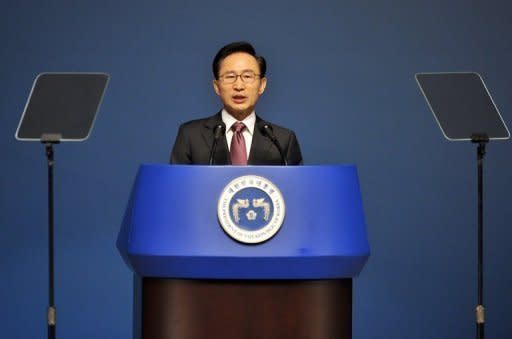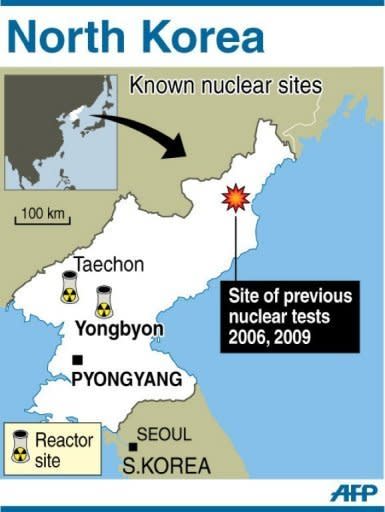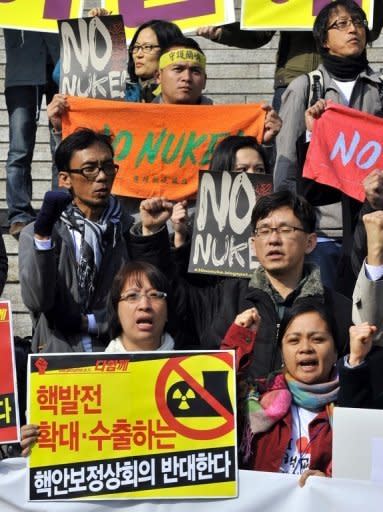N. Korea blasts Seoul over upcoming summit
North Korea Wednesday sharpened its criticism of an upcoming Seoul summit, saying any South Korean attempt to address the North's nuclear programme at the meeting would be seen as a declaration of war. The March 26-27 nuclear security summit, to be attended by US President Barack Obama and other world leaders, will focus on tackling nuclear terrorism. But the North's atomic programme -- and its widely condemned announcement of a planned rocket launch -- will be debated intensively on the sidelines. The US, Chinese and other leaders will discuss ways to press Pyongyang to scrap its launch when they meet next week, South Korea's President Lee Myung-Bak said in interviews published Wednesday. The North has previously blasted the event -- the South's biggest-ever diplomatic gathering -- as an "unsavoury burlesque" intended to justify an atomic attack by South Korea and its US ally. "It is a ridiculous attempt and an absolutely unpardonable criminal act for Lee Myung Bak, traitor for all ages, to bring someone's 'nuclear issue' up for discussion," its official news agency said Wednesday, adding the North's deceased leaders made denuclearisation their final wish. "Any provocative act would be considered as a declaration of war against us and its consequences would serve as great obstacles to talks on the denuclearisation of the Korean peninsula." The North's official media frequently refers to the likelihood of war breaking out. Its announcement of a rocket launch between April 12-16 -- purportedly to put a satellite into orbit -- has jeopardised a nuclear freeze deal reached only weeks ago with the United States. The US and its allies see the plan as a pretext for a long-range missile test, which is banned under a UN Security Council resolution passed after the North's missile and nuclear tests in 2009. Washington says any launch would also breach a bilateral deal which offered 240,000 tonnes of US food aid in return for a partial nuclear freeze and a suspension of missile tests. On Wednesday the US suspended a search for remains of American war dead in the North. "When there are suggestions that they might launch ballistic missiles, when they make bellicose statements about South Korea and engage in actions that could be construed as provocative, we think that it's not the right time to undertake this effort," Pentagon press secretary George Little told reporters. The US and North Korea had reached a deal in October to resume the search for thousands of war dead from the 1950-53 Korean war and previously US officials had not linked the recovery effort to disputes over Pyongyang's nuclear and missile programs. The North insists a peaceful satellite launch is not a missile test but even its close ally China has expressed concern. "The North's move to launch the so-called satellite has created a new topic of discussions at the summit, and it's an urgent timing," Lee said in interviews with the International Herald Tribune and other media. "The five nations share similar views on this," he said, referring to the US, Japan, China, Russia and his own country. All are members of the six-party talks, which has been struggling since 2003 to halt the North's nuclear weapons drive through negotiations. "The best option is for the five nations to try to persuade North Korea to cancel the plan," Lee said. His Unification Minister Yu Woo-Ik separately called the launch provocative and a senseless waste. "I can't help expressing my regret for such senseless action by the North's regime to go ahead with an immensely costly long-range rocket launch while its people cross the border because of political repression and hunger, to become fugitives in foreign countries," Yu told a forum. The blast-off is intended as part of celebrations for the 100th birth anniversary of national founder Kim Il-Sung, whose son Jong-Il took over the impoverished nation after his father's death in 1994. Kim Jong-Il died last December. His young and untested son and successor Jong-Un appears to be trying to bolster the dynasty's status with the launch. Some analysts say the North is following the same pattern as in 2006 and 2009, when it responded to criticism of rocket launches with a nuclear test. Daniel Pinkston, of the International Crisis Group think-tank, told a forum there is a "very high risk" of a third atomic test, probably using highly enriched uranium. The North might also mount conventional skirmishes or other provocations against the South later this year, he said.





